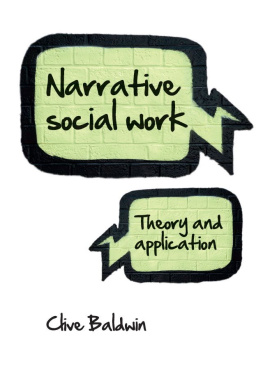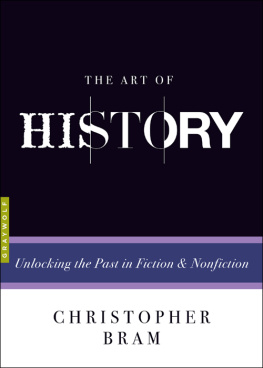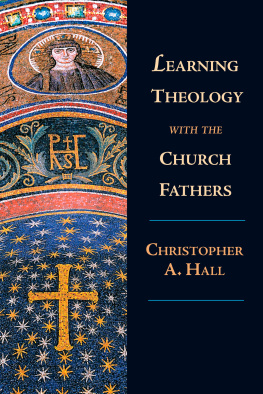SOCIAL WORK AS NARRATIVE
Social Work as Narrative
Storytelling and persuasion in professional texts
Christopher Hall
Research Fellow Dartington Social Research Unit
First published 1997 by Ashgate Publishing
Reissued 2018 by Routledge
2 Park Square, Milton Park, Abingdon, Oxon, OX14 4RN
711 Third Avenue, New York, NY 10017, USA
Routledge is an imprint of the Taylor & Francis Group, an informa business
Copyright Christopher Hall 1997
All rights reserved. No part of this book may be reprinted or reproduced or utilised in any form or by any electronic, mechanical, or other means, now known or hereafter invented, including photocopying and recording, or in any information storage or retrieval system, without permission in writing from the publishers.
Notice:
Product or corporate names may be trademarks or registered trademarks, and are used only for identification and explanation without intent to infringe.
Publisher's Note
The publisher has gone to great lengths to ensure the quality of this reprint but points out that some imperfections in the original copies may be apparent.
Disclaimer
The publisher has made every effort to trace copyright holders and welcomes correspondence from those they have been unable to contact.
A Library of Congress record exists under LC control number: 97076933
ISBN 13: 978-1-138-34412-9 (hbk)
ISBN 13: 978-0-429-43867-7 (ebk)
This book is based on my doctoral thesis awarded by Brunei, the University of West London in 1994. Carried out through part-time study, the thesis took a long time to complete and almost as long to re-write for publication. Throughout this period, a large number of friends, family and colleagues have helped with its completion and contributed to the development of the ideas. I wish to thank them all.
My career shift from a social worker to a researcher started at Leicester University School of Social Work, where staff and students provided an invaluable introduction to theoretical argument, especially Pauline Hardiker. At Brunei, staff and students in CRICT and the Department of Human Sciences provided a stimulating environment for developing ideas in new directions. My supervisor, Professor Steve Woolgar, has been a considerable influence, offering unlimited support and critical appraisal-he helped change a worry into a disbelief.
Friends and colleagues have read and commented on earlier drafts (sometimes in a helpful way). In particular, I want to thank Paul Atkinson, Bill Jordan, Bill Munroe, Tom Osborne, Jean Packman, Nigel Parton and Alex Taylor. The ongoing collaboration with Srikant Sarangi and Stef Slembrouck continues to be a major source of stimulation and without the help of Pam Hall, Jill Sharp and Kevin Mount the final manuscript would never have been produced.
Thanks must also be extended to the many social workers who have given up their time and patience to be interviewed, provide access to files and talk about their work My admiration for their resilience remains. My employers have also provided encouragement, financial support and study leave - a Social Services Department, National Foundation for Educational Research and Dartington Social Research Unit. Finally, special thanks to Jean Packman, my parents, and to Pam, Alice, Charlotte and Laurence-what can I say but 'sorry'.
Armoured with correctness and righteousness, social workers go out into the world, hunting for what they see as evil. Working constantly amongst the losers of society, it would be surprising if they did not develop a sense of knowing better than the rest of us. As individuals they are well-intentioned and often highly committed to the welfare of their clients. But entrenched behind their ideology and equipped with fearsome legal authority, they have achieved powers which they are plainly unfit to hold.
Daily Express, July 14, 1993
Critical media coverage of social work has been widespread over the last twenty years. The Daily Express article above is directed at policies of 'same race' adoption, but it could have been failure to protect children from negligent parents, being 'soft' on juvenile offenders or abuse in children's homes. Social workers are here portrayed as people with particular personal attributes: arrogant and supercilious but at the same time incompetent. The journalist makes the move from the personal to the professional by suggesting that these well intentioned people have become corrupted by their profession. Perhaps the sub-text is that society has somehow entrusted this group of workers with control and responsibilities which they have used irresponsibly and to their own advantage.
On other occasions the media has portrayed social workers as the opposite-woolly minded, easily taken in and indecisive. They have not used their powers appropriately and have been indecisive. As Franklin and Parton (1991) note, social workers are depicted as "inept and passive" as well as "intrusive and authoritarian". Whilst the criticism might not be consistent, its intensity is unabating. Such outrage and its associated moral indignation attacks the centre of social work-its practices, knowledge, values and attitudes. There are not just a few incompetent individuals but how all social workers think and act is challenged.
Scrutiny has not only been by the tabloid press. There has been government review and intense debate by academics. Child abuse, in particular, has come to dominate discussions about social work. In the UK, there were a series of critical inquiries in the 1980s and early 1990s which developed similar themes-too much interference in families (Cleveland 1988, Rochdale 1990, Orkney 1992) and not intervening enough (Beckford 1985, Henry 1987 and Carlile 1987). The Government produced the Children Act 1989 which tried to balance intervention and support. Many social services departments set up child protection strategies and guidance to promote 'good practice'. Even though high profile inquiries have not dominated the mid 1990s, a recent Government sponsored research report still considers the balance is not quite right (Department of Health, 1995).
What is it about social work that generates so much controversy and criticism? The power and authority that modern society has vested in professionals is not new nor restricted to social work (Friedson, 1986). Illich refers to the mid-twentieth century as the 'Age of the Disabling Professions'.
Let us first face the fact that the bodies of specialists that now dominate the creation, adjudication and implementation of needs are a new kind of cartel. They are more deeply entrenched than a Byzantine bureaucracy, more international than a world church, more stable than any labour union, endowed with wider competencies than any shaman, and equipped with a tighter hold over those they claim as victims than any mafia (1992:15)
Social workers, in particular, seem unable to protect themselves against public criticism. They appear more uncertain in their mandate and their claims to knowledge seem less ratified than more established professions. Some note that their work is unknown and unobserved. Barbara Wootton (1959:290) sums up the problem:
Other professions specify the nature of their cases: in medicine, general practitioners deal with cases of illness, specialists with cases of particular diseases: judges and magistrates deal with fraud, burglary ... but the (social) worker deals with-cases of what?









